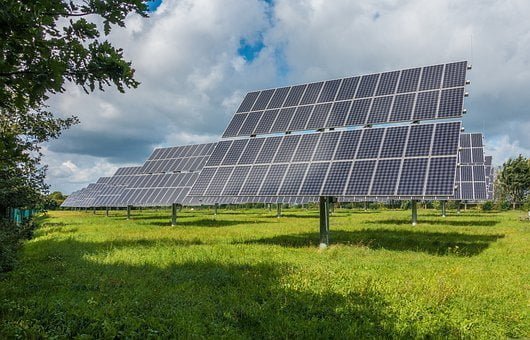Jump to:
Installing solar panels at your home is an excellent way to reduce your energy bills and reduce your carbon footprint. This renewable energy source can provide you with clean, green electricity that you can use to power any electronics or appliances in your home.
Solar panel installation isn’t complicated or expensive – the benefits are easy to access and well worth it in the long run. Generally, solar electric systems take around 2-4 days for installation, depending on how many panels you’re installing and the size of your property.
With modern technologies, solar panels are now more efficient than ever, so you can rest assured that you’ll get the maximum energy from them. Working with a solar company USA is the best way to ensure your solar installation is done correctly and safely.

Why Are People Moving Towards Installing Solar Panels At Your Home?
Installing solar panels at your home is an excellent way to reduce your electricity bills and contribute to conserving the environment.
In addition, many utility companies offer incentives like net metering and other benefits for people installing solar panels. Net metering allows homeowners with solar panels to send any excess energy they generate back into the grid, thus reducing their electricity bills even further.
It’s no wonder why many of us are switching to renewable energy sources like solar. With its considerable cost and labor benefits, it will only become more popular.
6 Things To Consider While Installing Solar Panels At Your Home
1. System size and energy requirements
System size and energy requirements are important considerations when installing solar panels in your home. The size of the solar system you get will depend on how much electrical energy your household needs – this is generally determined by the type of appliances you have and the amount of electricity you use.
Additionally, a larger system might suit you if you wish to have excess power stored away for future use. Moreover, the size of your building and available pathways for installation can also contribute to the type of system and several solar panels you can get.
Luckily, there are many ways to determine what kind of system best suits your needs – from engaging professional consultants to online information. All these critical factors should be considered to get the most out of your investment.
2. System performance and efficiency
System performance and efficiency are two important considerations when adding solar panels to your home. Ensuring that your system’s power output is optimal can sometimes require an extra layer of technical planning, especially if you are dealing with limited roof space or shade issues.
To ensure that your panels deliver top-notch performance, using a reliable quality panel means finding products that meet specific certifications and guarantees on their durability and power efficiency. Researching these qualifications before you buy will give you the peace of mind that your solar setup suits both short-term and long-term results. Installing high-efficiency solar panels can help unlock cost savings on your energy bills, so it’s worth considering all available options.
3. Budget constraints
Budget constraints are an essential factor when considering the decision to install solar panels at home. Solar energy is a valuable resource but has high up-front costs due to equipment, installation, and other related services.
Fortunately, some states offer incentives for solar energy use, which can help offset the initial expense. By conducting research and speaking with professionals in the industry, you can find a reputable installer offering quality products at an affordable price.
Additionally, many installers offer financing options that allow you to break up the payments over time instead of paying all at once. Though their up-front cost may be high, the long-term payoff of switching to solar energy can result in significant financial savings.
4. Roof structure, orientation, and shading
One of the essential considerations when installing a solar panel system at home is the roof structure’s orientation and shading. To maximize the effectiveness of a solar system, the mounting location should be chosen carefully.
South-facing roofs are optimal for capturing sunlight; however, if shadows from nearby trees or buildings obstruct direct sun exposure, east- and west-facing roofs also provide collector efficiency depending on your location and climate conditions.
The roof design should also be considered, as pitched roofs are best suited for installing panels. To ensure that your investment in solar energy is maximized, evaluating roof structure orientation and your home’s environment for shade before installation is essential.
5. Local codes and installation regulations
Before installing solar panels at your home, research and familiarize yourself with any local codes and installation regulations that may apply. Your local government or regulatory board may have rules applicable to solar system installations that you must adhere to, so it is vital to check these ordinances beforehand.
This can help ensure your and your neighbors’ safety, provide a secure installation, and guarantee efficient energy production. Understanding local solar permits can be essential for homeowners who want to benefit from the many benefits of setting up their renewable energy source.
6. Quality of components and warranty coverage
When deciding on a solar panel setup for your home, it is crucial to consider the quality of components and warranty coverage. Reliable solar panels are essential to maintain the efficient energy production that solar energy promises.
Good-quality components and warranties provide assurance that should any component malfunction; it can be repaired or replaced in an efficient and timely manner. Therefore, checking specifications like solar panel efficiency ratings and warranty details before buying is essential to maximize your return on investment when going solar.
Doing the necessary research will help you pick the best-suited equipment for generating clean, renewable energy from sunlight.
Conclusion
In conclusion, installing solar panels at home can be a fantastic way to save money on your energy costs and reduce your carbon footprint. While it is a vital investment upfront, the long-term savings will make it worth it.
Before making the decision, however, there are some factors to consider, like the size of your roof and the amount of sunlight. It is also vital to ensure that you are dealing with a trusted installer who has experience with solar panel installation so that you get the most out of your system.
With careful consideration and planning, you will be able to reap all the benefits of having solar power at home.

